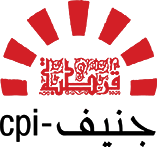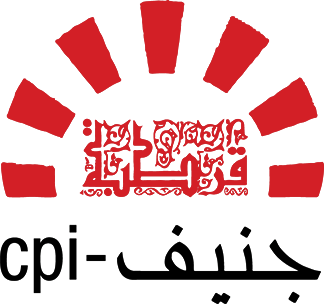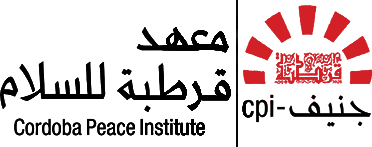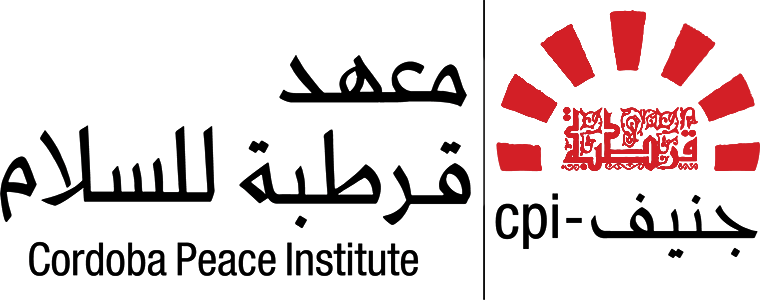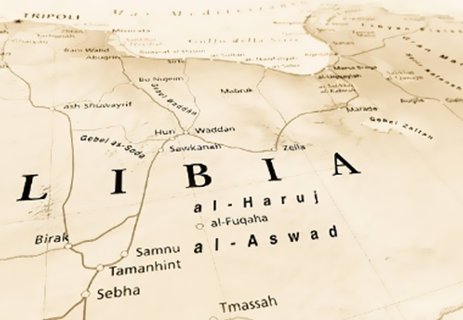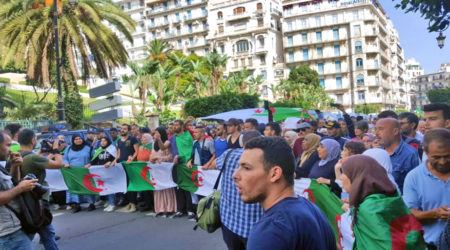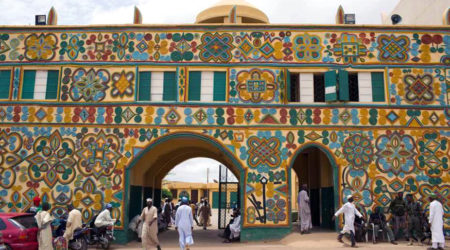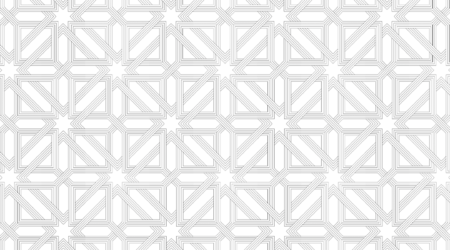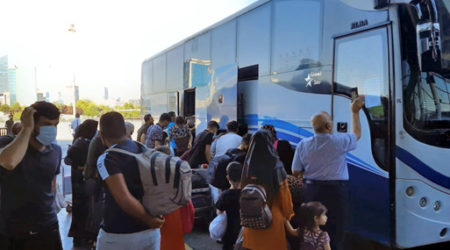The Winding Paths of Libya’s conflict

“I leave Libya with a heavy heart and deeply concerned.
I still hope it is possible to avoid a bloody confrontation in and around Tripoli.”
With this tweet, António Guterres, Secretary-General of the United Nations, left the Libyan capital, Tripoli, on 5 April 2019…
by Khaled Ibrahim
by Khaled Ibrahim
“I leave Libya with a heavy heart and deeply concerned. I still hope it is possible to avoid a bloody confrontation in and around Tripoli.”
With this tweet, António Guterres, Secretary-General of the United Nations, left the Libyan capital, Tripoli, on 5 April 2019, while retired general Khalifa Haftar’s artillery shelled the outskirts of Tripoli (1). Guterres left, without condemnation of the attack on the city’s residents, at a time when Libyans were looking forward to the convening of the Ghadames conference for dialogue among the conflict parties and hoping for a new political path to end the war declared by Haftar since mid-2014. Despite all the attempts undertaken by the UN mission UNISMIL headed by Ghassan Salamé, to mediate between the Government of National Accord in Tripoli (GNA) and the Tobruk House of Representatives (HoR) represented by Aqilah Saleh – the political front of Haftar – he failed to end the political division and escalating violence. A series of meetings was held in Palermo, Italy, Paris 1 and 2, and the Abu Dhabi meeting – which turned out to be the last meeting before Haftar’s campaign against Tripoli began. According to leaked information the understanding reached in Abu Dhabi between Fayez al-Sarraj, head of the Presidency Council, and Khalifa Haftar, and in the presence of Salamé, consisted of the sharing of the senior state positions and of granting military control over the army and security services to Haftar (2). What became known as the Abu Dhabi Understanding was, however, in contradiction to the Skhirat Agreement signed in 2015, which produced the internationally recognized GNA.
As a result of the Abu Dhabi Understanding, UNSMIL launched the Ghadames Dialogue, which was scheduled to be held in the presence of UN Secretary-General Guterres and his envoy Ghassan Salamé, in mid-April 2019. Libyans and foreign observers turned their eyes towards Ghadames, hoping for a new agreement that would end the state of division and set Libya on a political track instead of the raging civil war. But Haftar advanced his forces in an attempt to seize control of most of the Libyan southern territory and capture the Abrak Nashti base and Tamnhit. However, what the parties to the Abu Dhabi understanding did not expect, apparently, was that Haftar would not abide by the agreement and would rush to control not only military posts, but all of Libya.
The Abu Dhabi understanding and the shelling of Tripoli
In mid-April 2019 Haftar’s forces launched an attack on southern Tripoli, during the visit of the UN Secretary-General to Tripoli in a blatant disregard of the international system. The UNSG was conducting consultations with the Presidency Council ahead of the Ghadames conference. Thus, a new round of Haftar’s war to capture Tripoli began, significantly backed this time by Russian Wagner militias, African mercenaries, and military support from the UAE and Cairo. It appeared as if the internationally recognised Government of National Accord had been left to its fate, without any support, and not even a condemnation of the attack by the UN.
The GNA forces absorbed the shock, repelled the attack on Tripoli, and launched Operation Volcano of Anger. The President of the Presidency Council, Fayez al-Sarraj, felt the bitterness of betrayal, when he said, “we have been deceived.” It seems the concessions al-Sarraj offered to Haftar in Abu Dhabi, in late Feb 2019, were misinterpreted by Haftar as a sign of weakness in the Tripoli camp (3). It was a fierce war in which civilians paid a heavy price. Around 200,000 people were displaced from southern Tripoli with their families, and entire districts such as Ain Zara and Khallat Al-Furjan destroyed. For a full seven months, the GNA forces repelled Haftar’s forces’ campaign. Faced with this situation, the GNA government could not find a solution except to enlist the support of an international ally to help repel the aggression.
In late November 2019, the Government of National Accord signed a security cooperation agreement with Turkey. Turkish forces intervened in late December following a request from the Government of National Accord. Turkey’s support by land, sea, and air would then upset the geopolitical equation dramatically.
The Turkish intervention
Ankara swiftly funnelled military experts and materiel to the GNA government, the impact of which was clear on the battlefield. Haftar’s forces began to lose air control thanks to the effectiveness of Turkish drone strikes and weaponry. This qualitative change led to the withdrawal of the Russian Wagner militia and other mercenaries from the south of Tripoli. Thus, Haftar’s forces quickly lost their advanced positions on the battle axes around the capital to the GNA forces. By the end of April, Haftar’s forces had retreated to more than 600 km from the capital, Tripoli, and the entire western Libyan region was again under the control of GNA troops. They also regained control of the strategic al-Wattayah military base from which Haftar had launched attacks and operations to take over Tripoli, thereby forcing Haftar’s forces to withdraw to al-Jufra base in the south as well as to Sirte, some 500 km to the east from the capital.
The decisive Turkish intervention was an important factor in Haftar’s acceptance, under pressure from his backers, especially Russia, of a ceasefire. Haftar’s supporters feared losing control of Sirte, the oil fields and the al-Jufra military base. On the other hand, Russian and Egyptian reaction prompted the GNA and its Turkish ally to accept the ceasefire. This new reality on the ground paved the way for a resumption of negotiations led by the UN mission. For many observers in Tripoli this fresh mediation initiative was a last-ditch attempt to save Haftar’s camp.
Fearing the advancement of the GNA forces eastwards, Cairo summoned Aqila Saleh and Haftar to announce what became to be known as the Cairo Declaration, which considered Sirte a red line for Tripoli, the breach of which would trigger the direct intervention of the Egyptian army. The Egyptian parliament had granted Abdel Fattah al-Sisi the mandate to intervene in Libya, upon a request submitted by Aqila Saleh, the speaker of the Tobruk HoR. Meanwhile, international pressure increased on the GNA to halt the march of its troops east towards Sirte.
It was against this backdrop that Ghassan Salame, head of UNSMIL, resigned in early March 2020, when he expressed in a press conference his regret over the inability of the international system to solve the Libyan-Libyan conflict. He also regretted the involvement of international and regional parties in fuelling the war, which complicated his efforts. All eyes then turned to Algeria, where the name of its former foreign minister, Ramtan Lamamra, was rumoured as a possible successor to Salame. However, backstage lobbying in New York ruled him out. Instead, Stephanie Williams, UNSMIL deputy, took over as acting head of the mission.
Geneva Talks
As a shaky ceasefire appeared to hold in Sirte, Stephanie Williams (chargé d’affaires at the US Embassy in Tripoli until mid-2018) launched a diplomatic offensive which brought Aqila Saleh and al-Sarraj to declare, in two separate statements, a permanent ceasefire and the start of confidence-building measures. Despite the fanfare that surrounded the announcement, some sceptical observers considered the agreement merely another ploy to allow Haftar’s camp to recover from the blows the sustained at the hand of the strong and effective Turkish intervention. Stephanie Williams visited Cairo, Tunisia, Algeria, Turkey, France, Doha, Abu Dhabi and other countries intervening in Libyan affairs in order to persuade them to reduce negative interference in Libya.
Details of the agreement resulting from the talks of the 5 + 5 military Committee between Haftar and the GNA, in August 2020 in Geneva included agreement to meet in Libya and to exchange prisoners between the two parties. Besides opening land, sea and air ways, and the withdrawal of military and heavy machinery from the lines of contact, it was agreed to the return of forces to their camps and the withdrawal of mercenaries within 90 days of the signing of the agreement. While the mission seemed to be overly optimistic about this agreement many observers doubted its feasibility. On the ground, Haftar’s forces, Russian Wagner mercenaries and others had not stopped digging trenches, and the airlift of weapons to Haftar’s forces through Sirte airport had not stopped. Hafter was aiming to buy time while fortifying his position.
Tunisia Track
Good as the Geneva agreement may appear, keen observers of the Libyan conflict consider that for Haftar those measures would not mean much until he could see the result of the political dialogue Forum rounds convened by UNSMIL in November, in Tunis. Williams brought together 13 members of the High Council of State in Tripoli, and 13 members of the House of Representatives in Tobruk, while the UN mission selected the remaining 49 members of the dialogue committee. UNSMIL, did not, however, announce the criteria and mechanism they adopted in selecting the members, be it political or social or tribal influence in the current conflict. This practice aroused the ire of many parties who had reservations about the selection mechanism, especially since the UN mission had ignored important social segments such as the Amazighs and Tebu, as well as the internally displaced persons in eastern Libya who also protested against their exclusion.
It seemed as if Williams had shrugged off those objections in order to finalize a new agreement that would lead to the nomination of a new presidential council consisting of a president, two deputies, and a government separate from the Presidency Council, ending thereby the role of the High Council of State. Meanwhile, another problem had arisen concerning the distribution of senior positions along regional quotas. According to some observers, the mission’s consecration of regionalism in the draft constitutional or political agreement documents would not contribute at all to the stability of the state and could even increase polarization among the conflict parties. It should also be noted here that al-Sarraj, President of the Presidency Council, had announced his intention to leave power by the end of October, but the failure of the political dialogue in reaching a new political agreement during the announced period compelled the conflict stakeholders to demand from al-Sarraj to remain in his position until a new form of authority is agreed upon.
After a week of meetings in Tunis, Williams seemed optimistic about the progress made in the talks, but observers were stressing that the problems had not yet begun. While there was agreement on the duration of the transitional phase, the mechanism and prerogatives of the Presidency Council and the government, Williams faced the thorny obstacle of picking a president and two deputies of the Presidency Council, the Prime Minister, and understanding on the remaining senior positions. Unhealthy competition among the conflict parties to nominate key positions compelled the UN mission to pause the dialogue meetings in Tunis.
Morocco Meetings
Rabat convened the HoR members to hold a consultative session in late November. There was reason for optimism as more than 120 MPs attended the Tangiers meeting for the first time in years with such a quorum. They agreed to meet in Ghadames south of Tripoli. Several tasks that must be performed have been identified, including choosing a speaker for the House of Representatives in order to unify the legislative institution, and the need to end the transitional phase in order to end the political division and unify state institutions. But as soon as there appears to be light at the end of the tunnel, new obstacles appear. So Aqila Saleh, in Tobruk, threatened that the Tangiers track would undermine the Tunis track. Aqila Saleh realized that the MPs gathered in Tangiers had agreed that he should be removed from the presidency of the HoR. Therefore, observers do not expect the efforts to unify the two rival parliamentary bodies to succeed.
Elections to overcome the leadership and clash of loyalties
It does not seem that Stephanie Williams is in a comfortable position, with everyone insisting on their candidate. While the representatives of the Cyrenaica region are fighting in the dialogue over the necessity for the President of the Presidency Council to be from Barqa, a number of the members of the dialogue team refuse that Aqila Saleh be the candidate for that position. Meanwhile, the GNA camp, represented by Fathi Bashagha and other candidates, are fighting over the position of prime minister, (which seems to have become part of the quota of the Tripolitania region), the names of Abd al-Majid Seif al-Nasr or Ali Zeidan, former prime minister, are also rumoured to hold the position of vice president of the Presidency Council reserved for the Fezzan region.
Furthermore, the HoR failed, during its session in Ghadames, to pick a president for the council or agree internal regulations that would govern the administration of the parliament. Arguably, one of the reasons for this failure is UNSMIL’s apparent insistence on sharing of senior positions according to Libya’s three historical regions. It is not expected that a breakthrough will be made in overcoming the current deadlock. Most likely, one of the strong reasons for their acceptance to meet is only their concern that they would be replaced by the dialogue committee in Tunisia, as the UN mission has hinted repeatedly.
Faced with these difficult choices, the UN mission finds itself revolving in a vicious circle of power struggles where satisfying one party makes it lose the other parties. Thus, a third current outside the dialogue team and the deadlock in which the rival bodies are locked is raising the alternative track of going to legislative elections in accordance with the current Constitutional Declaration and the 2014 electoral law. The elections commission had expressed its readiness to organise elections within two or three months at the latest. Supporters of this option believe that going to parliamentary elections will achieve multiple results. The elections will ensure an exit from the state of division of the legislative body, as well as the exit of all conflict parties from the scene, thereby giving way to a circulation among the elite and the emergence of a fresh political scene that may be less divided. However, those who stand to lose much from this proposal in Libya, and their regional and international backers, are the ones opposing it.
Therefore, more fragmentation and conflicts among the conflict parties and within each camp is in the offing. A new crisis has flared up between the governor of the central bank in Tripoli and the president of the National Oil Corporation. Apparently, the latter had refused to transfer oil revenues to the account of the central bank and had frozen them, in what appeared to be another power struggle in Tripoli. Meanwhile, a meeting took place, under European pressure, between the president of the central bank in Tripoli and his counterpart in Benghazi. The bank’s board of directors met for the first time in years, and they agreed to unify monetary policy and the exchange rate.
In conclusion, the UN mission is likely to have the last say and nominate its candidates for the senior state positions in order to overcome the entrenched power struggle. As Stephanie Williams hints at international sanctions on actors obstructing the dialogue process, Guterres has appointed in mid-December 2020 Bulgarian Nickolay Mladenov as his new envoy to mediate the Libyan conflict (4), but the Mladenov told the UNSG that he will be unable to assume this position due to “personal and family reasons”, according to Reuters. To find another alternative will be one of the urgent tasks of Guterres in the beginning of 2021.
References
(1) https://twitter.com/antonioguterres/status/1114187435460767744?s=20
(4) https://www.reuters.com/article/un-conflict-libya-mideast-int/u-n-security-council-approves-new-u-n-envoys-to-mediate-libya-mideast-idUSKBN28P335
